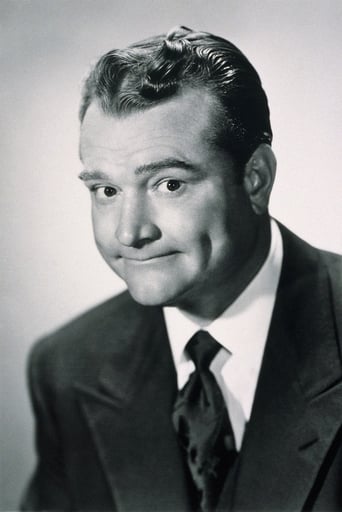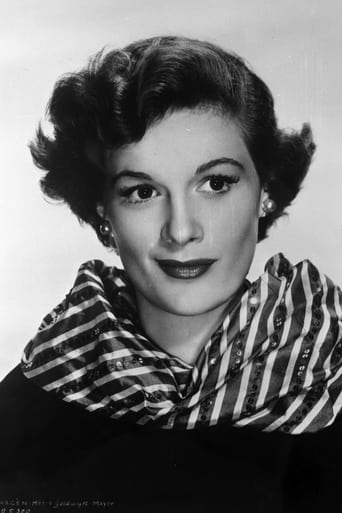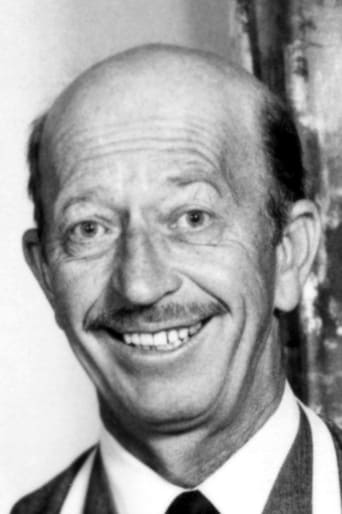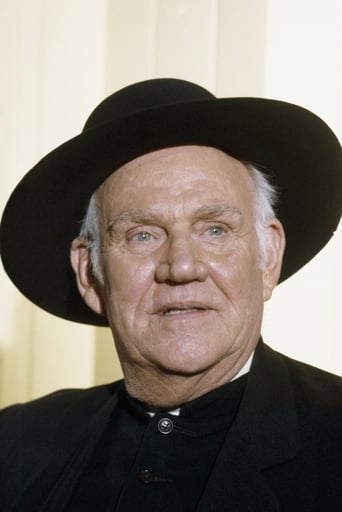Exoticalot
People are voting emotionally.
Pacionsbo
Absolutely Fantastic
ThedevilChoose
When a movie has you begging for it to end not even half way through it's pure crap. We've all seen this movie and this characters millions of times, nothing new in it. Don't waste your time.
Erica Derrick
By the time the dramatic fireworks start popping off, each one feels earned.
MartinHafer
Ben Dobson (Red Skelton) is a newly wed who just got a job working for a very old fashioned and frugal boss. The boss values thrift and expects Ben to do the same. Unfortunately, Ben's wife, Martha (Jean Hagen) is NOT so inclined. She is like many folks in the post-war era...she wants it all. She wants a big house in the country, a car, a television and all the stuff that comes with it. As for Ben, you don't really know how he stands on any of this as he's henpecked and Martha makes all the decisions for them. Eventually, he finally let's it out....they can barely afford this life she's chosen and he thinks they need to move back to the city. Of courses, Martha ignores him and insists they continue living outside their means.As for the frugal boss, he doesn't know that Ben's moved to the suburbs and thinks he still lives in the small New York City apartment he was in at the beginning of the film. This leads to a hilarious scene where he takes the boss 'home'....sneaking into his old apartment and pretending the little girl there is his kid...yet, she inexplicably only speaks French!!Soon the boss commissions Ben to write an article about life in suburbia...and he wants the article to talk about how folks are over- extending themselves and cannot afford this extravagant lifestyle. Ben decides to do it, after all it IS his job, but doesn't tell his wife about it....and when she learns, she is furious with him. What's next? See the film.This is a comedy but I found myself only laughing a bit. Mostly, I found myself wanting to throttle Martha...and fortunately my wife also was watching the movie and agreed with me. She didn't seem to love Ben during most of the movie...just what he could buy for her. Because of this, the film has a very dark undertone and is quite the morality tale about the post-war acquisitiveness that infected many in the States. Now this is NOT a complaint...I actually like that the film was less comedy and more morality tale. It gave the film some depth you rarely see in a Skelton picture.
jacobs-greenwood
This Red Skelton comedy provides a social commentary of its time that's not as dated as one might think. In fact, it reminded me of a recent "keep up with the Jones" commercial for a financial lending organization at first, with a little bit of Mr. Blandings Builds His Dream House (1948) later. Skelton plays a New York magazine writer named Ben Dobson whose ambitious – one might even say 'social climbing' – wife Martha (Jean Hagen) 'encourages' him to continuously 'evolve' into the husband (for the life) she wants. It was directed by Don Weis and written by Max Shulman. Polly Bergen appears as herself in a restaurant club scene that feels out of place in the story.Ben finds a job working for Mr. Bascomb (Charles Dingle) at Everybody's magazine in New York City; "Everybody loves Everybody's" (a kind of a "Life" magazine). Bascomb is a man of "sound principles", who insists that his employees are as thrifty as he is. During the job interview, Ben more or less goes along with or agrees with whatever Bascomb says and is hired. Ben had been a freelance writer, but this new steady job provides Martha with the opportunity to 'enhance' their domestic situation. First, she manipulates him into having their first child, then (after five years, which pass in less than 10 minutes of screen-time) into moving out of their city apartment to a suburban home with their son Pete (Hugh Corcoran). Willard Waterman plays the friendly and convincing (if conniving) real estate agent Charles McEstway.Once ensconced in Williams Landing, Martha persuades Ben to 'improve' their lives with one purchase after another, and soon the Dobsons are treading on thin ice using credit for furniture, a television set and other home improvements (and plumbing repairs). Ben decided not to tell his boss – Bascomb would surely not approve – about their moving to the suburbs, which leads to an awkward/unusual moment (that may have been funnier at the time of the film's release than it plays today). Ironically, Bascomb wants Ben to write his first article – he'd been a rewriter (e.g. an editor of sorts) all this time – about the folly of suburbia, and going into debt to buy a home and all the associated "things" (pretty current, eh?).While initially reluctant, Ben feels forced into taking the assignment by Martha's never ending desire for more; her "need" for a car convinces him to do it. He decides to accept the role of "Community Chest" collector (this is a dated concept) in order to get to know his neighbors better and learn about how everyone else in Williams Landing is "up to their eyeballs in debt". He figures that after his articles are published, Martha will be so embarrassed – and the Dobsons so ostracized – that she'll have to let them move back to the city.Several comic scenes follow: Ben learns about one neighbor's new addition – an activities room – and another's outdoor grilling/eating patio. His articles are caustic, just the kind of impactful stuff that his boss wants. But when Martha finds and reads them (before they're published), while not happy, she finally understands and agrees to let Ben list the house.However, when McEstway brings a couple (Mary Wickes and Frank Cady) of prospective buyers to see the house, their comments about what the Dobsons have built (and call home) make Ben defensive. His perspective changes, and so does the conclusion of his series of articles; upon reading it, Bascomb is at first perplexed and then angry. But henpecked Ben follows his wife's script (we learn later) to get a promotion and a raise, just in time for the coming of their second child.
DKosty123
MGM designs another 1953 B feature here. They put television director Don Weis behind the camera, and sitcom writer Max Schulman who would punch Dobie Gillis to write a forgettable script. One could only wish MGM got more committed to making a better film here.The cast here, while experienced is really not a lot of support, and that does not help this one. If you tune in for Red Skelton being funny, you get what you want out of this picture. Most of the cast is television actors. It feels like a summer vacation from TV movie.If you tune in looking for a classic film, this one is not even close.Splitting Diamonds is not the same as crop dusting, though both can be killers. The bad guys act like Ben Dobson (Red's) family. In the end the family all falls apart and breaks down while Red is still prepping to cut a large diamond.It is a hopeless tale with some humor.
Randy Cliff
I saw this movie many years ago, but couldn't remember anything about it. Watching it again, I think I know why. "Half a Hero" is probably enjoyed better as a drama or a view of the world at a certain point in time. Watching Red Skelton is always enjoyable, but wanting this movie to be a comedy can make the viewing almost painful.Men working hard is great and women wanting to make house & home is wonderful -- whether it's today or 60 years ago. The pain for me surfaces when this couple are at odds during their financial difficulties, bringing up talks that should precede marriage and not deferred until after getting a mortgage.So if you approach this movie from a non-comedy perspective, I think you will enjoy it. Skelton's performance is almost as good as in _The Clown (1953)_ (qv). Jean Hagen demonstrates a wonderful difference from _Singin' in the Rain (1952)_ (qv) where everyone remembers "Lina Lamont". Single scene participants of 'Kathleen Freeman (I)' (qv) and 'Mary Wickes' (qv) made me smile.This production made a profit when it was released and then quietly disappeared. If you can find a copy of it, Skelton fans should definitely watch it. Maybe young people getting ready for marriage can learn one or two things as well.





